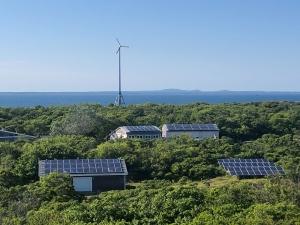From Improving Wind Energy Infrastructure to Water Conservation: Introducing the Shoals Marine Laboratory Summer 2022 Sustainability Engineering Interns

Shoals Marine Laboratory on Appledore Island, eight miles off the coast of Maine, has been on the cutting edge of sustainability engineering for almost 2 decades. This green progress is made possible through collaboration between sustainability engineering interns, island engineers, and strategic partnerships.
According to Tom Johnson, an engineering professional who has served as a program mentor since its beginning, the interns’ work has fundamentally changed the island’s infrastructure systems, including renewable energy and water conservation systems.
“There's hardly a place on this island I can go without having a story about how it was impacted by the interns,” Johnson said.
Shoals Marine Lab is a joint-institution of the University of New Hampshire and Cornell University, but hosts scientists and students from around the world. Appledore Island is home to research and academic courses, as researchers investigate ecological questions and educate the next generation.
While being surrounded by the ocean helps Shoals Marine Lab researchers and professors, the distance from the mainland also makes providing island residents with electricity, supplies, and running water challenging. The task of making daily life on the island possible throughout the summer is the work of the island’s engineers.
This summer’s sustainability engineering interns, Zach Katz, Izzy Medeiros, Jason Shao, and Tess Hays, started working as soon as they stepped foot on the island, visiting infrastructure sites, consulting with engineering experts and developing plans. They learn from island engineers and visiting experts about topics including erosion control strategies, ways to measure environmental impacts, and the island’s infrastructure systems in general.
“I thought the idea of life cycle analysis was super interesting,” Katz said. “You have to consider the cost of transportation, disposal, maintenance and other factors when evaluating the sustainability of a system, not just the energy from using the system.”
In the past, Shoals Marine Lab relied entirely on diesel-fueled generators, a system that created greenhouse gas emissions and the challenge of transporting diesel to the island. Engineers have built solar and wind energy systems, as well as assessing ways to conserve energy, reducing the islands dependence on diesel by approximately 80%.
Engineers can raise and lower the blades of the island’s wind turbine for maintenance, a system that the interns will help make more efficient. They will also analyze the amount of energy that wind energy is providing the island after recent updates. The interns are excited to help Shoals Marine Lab better understand and improve its wind energy system, a vital part of the island’s reduced use of fossil fuels.
“Wind is really important because it can produce energy at night when solar can’t, so making sure it can run efficiently is important for the island's infrastructure,” Shao said.
Other critical systems on the island include providing running fresh water for people and the famous Cecilia Thaxter Garden, salt water for marine life in the laboratories, and environmentally friendly wastewater treatment. This year’s projects include an assessment of the sustainability of drinking water systems. Interns will also find ways to improve rainwater collection to irrigate the garden.
“It will be fascinating to learn about the true sustainability of the drinking water system. As we know it, it is a very sustainable system, it provides water for the island while using mostly renewable energy,” Hays said. “It will be interesting to see what the lifecycle of that system is, from manufacture to assembly to maintenance to disposal.”
At Shoals Marine Lab, too much water can be as much of a concern as too little. People, plants, and animals alike need water to live, but intense rainstorms pose an erosion threat to the island's roads. One of the projects interns are working on is recommending strategies to control this erosion, stabilizing the land for years to come.
“You can get information about erosion by looking at it, but we are going to use old fashioned land surveying techniques,” Medeiros said. “We will evaluate the elevation of parts that have been eroded and when we compare this with elevations from prior years we can see how much has eroded.”
This year’s interns are hard at work building on the foundations set by the island engineers and previous summers’ interns, helping improve the sustainability of Shoals Marine Lab’s infrastructure while learning more about the burgeoning field of green engineering.
